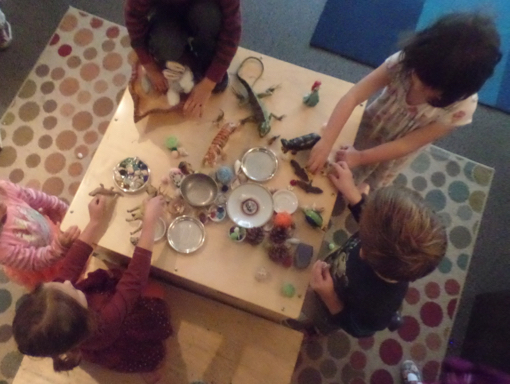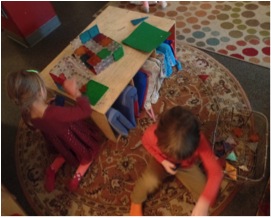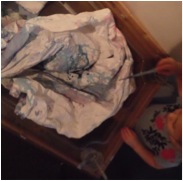
Why I don’t make kids say “Sorry”
by Chelsea Myers, Educator, Hilltop Children’s Center
If you’ve ever tried to split a cookie between children then you know how hyper-aware they can be of whether things feel fair to them. So often, conflicts come down to who is in charge, who has more, and who has less. Social justice and the corresponding themes of power and resource allocation are a natural result of teachers and children living and learning together in their shared space. In all other areas, I resist the temptation to solve their problems.
Why, then, do I struggle to take a step back in these moments? As a teacher, how can I give my students authentic opportunities to master “making it fair?” How do I keep my own biases in check? How can I challenge their idea that fair must equal same?
“He has more Magnatiles than me and it’s not FAIR!” Max is building, using dozens of Magnatiles, Rosa has a small stack in her hands. Max has been working on this structure for about 10 minutes, Rosa just arrived. What’s the fair move? Is it fair to potentially inhibit Rosa’s building abilities due to lack of materials? Is it fair to interrupt Max’s concentration in order to possibly take some materials away? Unsure of the best course, I turn it back to Rosa. She decides that she doesn’t need that many Magnatiles anyway. Did I just discourage or discount her? Or did she realize that she didn’t need any more?
“He yelled at me and punched me – I want him to say ‘Sorry!’” Eddie has tears streaming down his face. The accused has already  checked in with him, asked if he needed anything. In anger, Eddie shouted “No!” so he has been left alone. I try to prepare him, the other boy may not be sorry. And if he is not sorry, I am not going to make him apologize. An apology that isn’t backed up by actual remorse isn’t going to build any understanding or empathy within either child. There are other ways to fix this – actually fix this: an ice pack, a hug, a promise to try to use words next time, some acknowledgement that Eddie was hurt. As we’re talking, he shares more of the story. “Well, I was running and I bumped him like this.” He bumps one foot against the other. “But I’m not going to say ‘Sorry.’” “Are you sorry?” I ask. “Yes, but I’m not going to say it because he’s not saying it to me!” Oh goodness, I am not sure what to do. Both boys are ready to talk again; one not sorry but willing to engage, one sorry but struggling to. It takes some time, but we come to agreement. The boy who punched will try to just use words next time. Eddie apologizes for bumping and asks, “Are you okay?” Minutes later, he runs and bumps into me. “Sorry, Chelsea!” And he’s off.
checked in with him, asked if he needed anything. In anger, Eddie shouted “No!” so he has been left alone. I try to prepare him, the other boy may not be sorry. And if he is not sorry, I am not going to make him apologize. An apology that isn’t backed up by actual remorse isn’t going to build any understanding or empathy within either child. There are other ways to fix this – actually fix this: an ice pack, a hug, a promise to try to use words next time, some acknowledgement that Eddie was hurt. As we’re talking, he shares more of the story. “Well, I was running and I bumped him like this.” He bumps one foot against the other. “But I’m not going to say ‘Sorry.’” “Are you sorry?” I ask. “Yes, but I’m not going to say it because he’s not saying it to me!” Oh goodness, I am not sure what to do. Both boys are ready to talk again; one not sorry but willing to engage, one sorry but struggling to. It takes some time, but we come to agreement. The boy who punched will try to just use words next time. Eddie apologizes for bumping and asks, “Are you okay?” Minutes later, he runs and bumps into me. “Sorry, Chelsea!” And he’s off.
There a piece of butcher paper crumpled into the sensory table. Watercolor paints and four pipettes are available in cups. Violet  and Jaime are each using two pipettes, squirting paint into the nooks and crannies of the paper. Theo approaches, “I want to do that.” Violet easily hands over a pipette. Following her lead, Jaime begins to do the same. I watch as he does the math in his head…Theo will have two…he and Violet will each have one…”I’m going to put this one here for the next kid,” Jaime explains as he puts the extra pipette into an empty cup.
and Jaime are each using two pipettes, squirting paint into the nooks and crannies of the paper. Theo approaches, “I want to do that.” Violet easily hands over a pipette. Following her lead, Jaime begins to do the same. I watch as he does the math in his head…Theo will have two…he and Violet will each have one…”I’m going to put this one here for the next kid,” Jaime explains as he puts the extra pipette into an empty cup.
Each day gives us multiple opportunities to explore justice: how to describe it, how to create it, how to feel it. Teachers know that children learn best when they are engaged in meaningful ways and when we focus on the process instead of the product but we struggle to apply those principles in this area. What rights do your children have when it comes to accessing and influencing the decision making behind what is fair in their classroom community? What do we adults need to feel comfortable navigating conflict with our students?
3 thoughts on “Why I don’t make kids say “Sorry””
Comments are closed.
Chelsea, thank you for this insightful & thought-provoking article. As another mixed-age teacher, I also struggle at times with implementing my own belief that “fair is not always equal”, especially when it comes down to seemingly simple issues like not having enough Magna Tiles in the basket. Your article shines a vital light on the early lessons your students (and your teaching team) are learning about justice through these daily interactions, which I believe pave the way for anti-bias work & future advocacy.
Wow. Great article. Really makes me think about what my parental responsibility – and involvement – should be in such skirmishes.
In the coitlmcaped world we live in, it’s good to find simple solutions.